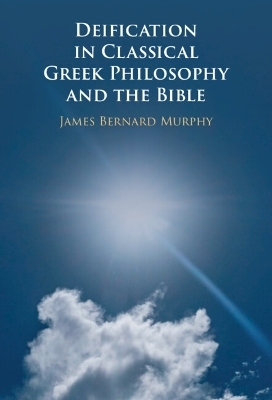
Deification in Classical Greek Philosophy and the Bible
Seiten
2024
Cambridge University Press (Verlag)
978-1-009-39292-1 (ISBN)
Cambridge University Press (Verlag)
978-1-009-39292-1 (ISBN)
The goal of human life, according to Plato, Aristotle, and the Bible, is to become as much like god as possible. This book, written in vivid and lucid English, illuminates Greek philosophy by showing how it grows out of ancient Greek religion and how it compares to biblical religion.
To be human is to strive to be better, and we cannot be better without knowing what is best. In ancient Greek philosophy and the Bible, what is best is god. Plato and Aristotle argue that the goal of human life is to become as much like god as is humanly possible. Despite its obvious importance, this theme of assimilation to god has been neglected in Anglo-American scholarship. Classical Greek philosophy is best understood as a religious quest for divinity by means of rational discipline. By showing how Greek philosophy grows out of ancient Greek religion and how the philosophical quest for god compares to the biblical quest, we see Plato and Aristotle properly as major religious thinkers. In their shared quest for divine perfection, Greek philosophy and the Bible have enough in common to make their differences deeply illuminating.
To be human is to strive to be better, and we cannot be better without knowing what is best. In ancient Greek philosophy and the Bible, what is best is god. Plato and Aristotle argue that the goal of human life is to become as much like god as is humanly possible. Despite its obvious importance, this theme of assimilation to god has been neglected in Anglo-American scholarship. Classical Greek philosophy is best understood as a religious quest for divinity by means of rational discipline. By showing how Greek philosophy grows out of ancient Greek religion and how the philosophical quest for god compares to the biblical quest, we see Plato and Aristotle properly as major religious thinkers. In their shared quest for divine perfection, Greek philosophy and the Bible have enough in common to make their differences deeply illuminating.
JAMES BERNARD MURPHY is Professor of Government at Dartmouth College. He is also the author of How to Think Politically (with Graeme Garrard, 2019) and Haunted by Paradise: A Philosopher's Quest for Biblical Answers to Key Moral Questions (2021).
Introduction: Why better implies best; 1. Theology as anthropology, anthropology as theology; 2. Heroic deification in Ancient Greek religion; 3. Ironic deification in Socrates; 4. Civic deification in Plato; 5. Developmental deification in Aristotle; 6. Deification as loving union with God in the Bible; Conclusion: Athens and Jerusalem.
| Erscheinungsdatum | 22.08.2024 |
|---|---|
| Zusatzinfo | Worked examples or Exercises |
| Verlagsort | Cambridge |
| Sprache | englisch |
| Maße | 152 x 229 mm |
| Gewicht | 721 g |
| Themenwelt | Geisteswissenschaften ► Philosophie ► Philosophie Altertum / Antike |
| Religion / Theologie ► Christentum ► Kirchengeschichte | |
| ISBN-10 | 1-009-39292-1 / 1009392921 |
| ISBN-13 | 978-1-009-39292-1 / 9781009392921 |
| Zustand | Neuware |
| Haben Sie eine Frage zum Produkt? |
Mehr entdecken
aus dem Bereich
aus dem Bereich
von Athanasius bis Gregor dem Großen
Buch | Softcover (2024)
C.H.Beck (Verlag)
12,00 €


